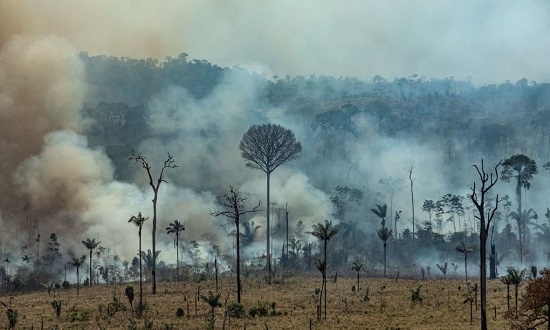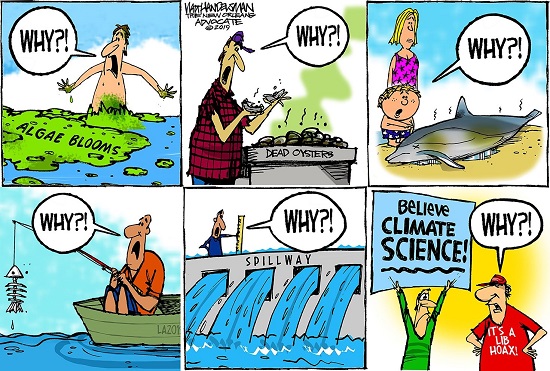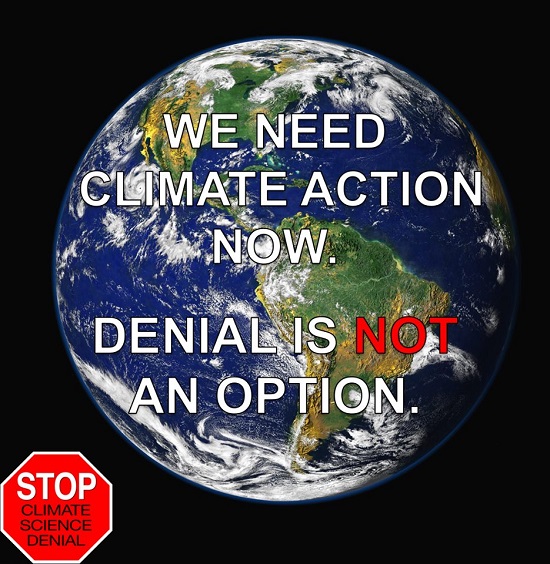2019 SkS Weekly Climate Change & Global Warming Digest #34
Posted on 25 August 2019 by John Hartz
Story of the Week... Toon of the Week... Coming Soon on SkS... Climate Feedback Reviews... SkS Week in Review... Poster of the Week...
Story of the Week...
G7 can’t turn a blind eye to ecocide in the Amazon
Leaders must ask themselves if Jair Bolsonaro’s destructive attitude to the forest and its peoples should be considered a crime

The fires in the world’s largest rainforest have triggered a global outcry and are dominating the G7 meeting in Biarritz in southern France. Photograph: Victor Moriyama/Getty
When G7 leaders sit in judgment on Brazilian president Jair Bolsonaro this weekend, the question they should ask themselves is whether the rape of the natural world should finally be treated as a crime. The language of sexual violence will be familiar to the former army captain, who publicly admires the sadistic torturers of the dictatorship era and once said to a congresswoman, “I would never rape you because you are not worth it.” Last month, after Pope Francis and European leaders expressed concern about the Amazon, Bolsonaro lashed back by claiming: “Brazil is a virgin that every foreign pervert desires.”
As a nationalist, the president sees the Amazon in terms of ownership and sovereignty. As a chauvinist, he sees the region as a possession to be exploited and opened up, rather than cherished and nurtured.
Since taking power eight months ago, Bolsonaro has, layer by layer, stripped the rainforest of protections. First, he weakened the environment ministry and put it in the hands of a minister convicted of environmental fraud. Second, he undermined the agency responsible for monitoring the forest, Ibama. Third, he alienated Norway and Germany, the main donors to forest-protection causes. Fourth, he tried to hide what was happening by sacking the head of the space agency responsible for satellite data on destruction. Fifth, he accused environmental charities of starting fires and working for foreign interests. And sixth, he verbally attacked Amazon dwellers – the indigenous and Quilombola communities who depend on a healthy forest.
With these defences down, the president has encouraged outsiders from the mining, logging and farming industries to take advantage of economic opportunities. The results have been brutal. Last month, deforestation surged by 278%. This month is almost certain to be a record for August under the current monitoring system. The wounds are impossible to cover up. The Amazon’s fires are now burning on front pages, news broadcasts and social networks across the world.
G7 can’t turn a blind eye to ecocide in the Amazon by Jonathan Watts, Environment, Observer/Guardian, Aug 25, 2019
Toon of the Week...

Hat tip to the Stop Climate Science Denial Facebook page.
Coming Soon on SkS...
- Why German coal power is falling fast in 2019 (Karsten Capion)
- Skeptical Science New Research for Week #34 (Doug Bostrom)
- A lecture program about climate change for people with learning disabilities (Baerbel)
- What psychotherapy can do for the climate and biodiversity crises (Caroline Hickman)
- Consensus on consensus hits half million downloads (John Cook)
- 2019 SkS Weekly Climate Change & Global Warming News Roundup #35 (John Hartz)
- 2019 SkS Weekly Climate Change & Global Warming Digest #35 (John Hartz)
Climate Feedback Reviews...
[To be added.]
Poster of the Week...

SkS Week in Review...
- 2019 SkS Weekly Climate Change & Global Warming News Roundup #34 by John Hartz
- The North Atlantic ocean current, which warms northern Europe, may be slowing by greenman3610 (Yale Climate Connections)
- Skeptical Science New Research for Week #33, 2019 by Doug Bostrom
- Market Forces and Coal by Riduna
- 2019 SkS Weekly Climate Change & Global Warming Digest #33 by John Hartz































 Arguments
Arguments






























The Amazon rainforest also creates rain.
"By the middle of the century, deforestation in the Amazon could reduce rainfall by up to 20%, even in areas far from those that have lost trees."
"Tropical forests release huge volumes of water to the atmosphere, where it moves around and is recycled as rainfall — but pasture and farmland do not. Delphine Zemp at Humboldt University in Berlin and her colleagues modelled how the loss of forests could affect rainfall across South America. They calculate that if deforestation continues at roughly its current rate, dry-season rainfall will decrease by 8% across the Amazon basin by 2050, with localized hotspots losing up to 20% of their rain."
"The greatest reductions in rainfall were seen in the southwestern part of the Amazon, and could make the region more vulnerable to disturbances such as extreme drought and fire. Rainfall loss from deforestation could therefore lead to further environmental degradation."
This could affect neighbouring countries as well. Imho sovereignty is not the right to damage your neighbours interests. If the situation is not resolved diplomatically, it could lead to serious conflicts. Bolsonaro is not providing good leadership.
I agree with the understanding that "...sovereignty is not the right to damage your neighbours interests."
Sovereignty also does not defend actions harmful to the future of humanity.
Said another way, Self-Interest cannot be allowed to result in Actions that are beneficial to a portion of the population by being harmful to Others or the Future of Humanity. In "Reasons and Persons" (1984), Derek Parfit presented a detailed and robust rational ethical proof that self-interest as a Governing Principle can be expected to produce harmful results.
What is most important for the sustainability of any culture or nation (or business) is that its Governance incorporates improving awareness and understanding of what is required for sustainability (the achievement and improvement on the Sustainable Development Goals). Failure to make understandably required Governance corrections compromises the future of the nation, culture, or business.
Within Collectively Governed cultures, nations, and businesses (those where employees have significant influence), it is well understood to be beneficial for there to be penalties to limit the amount of harmful pursuit of self-interest by individuals or groups within the Governed population (or its competition). It is also understood that rewards for helpful behaviour can also be beneficial to the sustainability of the culture, nation, or business.
The problem regarding Climate Change, and many other developed human activity impacts requiring correction, is that International Law does not effectively exist (only things like Universal Declarations, Accords, Treaties, Pacts, and Agreements that sort of influence leadership).
Nations and States or Provinces, and to some degree cities (and of course businesses) can develop rules and laws governing what happens within their populations. But Nations and International Businesses are hard to govern through those external legal mechanisms (even China's central government struggles to govern what happens in Regions within China). And of course the lack of International Law leaves decisions about corrective collective national actions, like trade sanctions or agreements to breech sovereignty to intervene, up to the fickleness and potential harmfulness of self-interested leadership.
People like Stephen M. Gardener are pushing for International Rule development and corrections. But many powerful people are resisting the Governance improvements because they prefer to get away with pursuing "Their Self-Interests" and defending "Their Developed Status in the Status Quo".
What happens in the Amazon has impacts across the world, something the current government of Brazil is ignoring as it refuses international aid to fight the 75,000 fires in the region.
A question/suggestion and a correction regarding the presentation of the Story of the Week.
I read the full article linked at the bottom of the part that was extracted and presented here. Is there a way to be clear that only an extract of the full story is being presented here? Could the link be provided at the top rather than at the end of the extract?
I also just noticed that the Big W at the start of the full article did not get picked up at the start of the exctract.
[JH] Beginning with this week's edition of the Weekly Digest, I will embed a link to the full article in the initial title of the article appearing immediately after the heading, "Story of the Week". I will also add text at the end of the article indicating that what is presented above is only an excerpt of the complete article — typically the introductory paragraphs. I'll incorporate both changes into "Editor's Choice" article of the Weekly News Roundup. Thank you for the suggestions.
The missing "Big W" has been inserted. Thanks for catching and pointing out this glitch.
Comments 3 through 6 on "2019 SkS Weekly Climate Change & Global Warming News Roundup #34" directly relate to this Story of the Week.
One thing to add to the many concerns that are presented in these two posts and their related comments (or present more directly) is the reduction of biodiversity due to human impacts reducing Rainforest extents.
Researchers in Rainforsts are constantly discovering lifeforms that have never before been documented. That makes it likely that, unlike the likes of DoDos and Passenger Pigeons, there are almost certain to be losses of unkown biodiversity. And that could mean losses of lifeforms with potential for human benefit. Those opportunities for human benefit will never be known to have been lost forever. And that loss will have happened because a portion of current day humanity had developed powerful desires for "other interests and priorities" and allowed those interests and desires to compromise the environment and biodiversity to the detriment of the future of humanity.
As the full Story of the Week concludes: "The fires in the Amazon remind us this is not just a crime against nature but a crime against humanity."